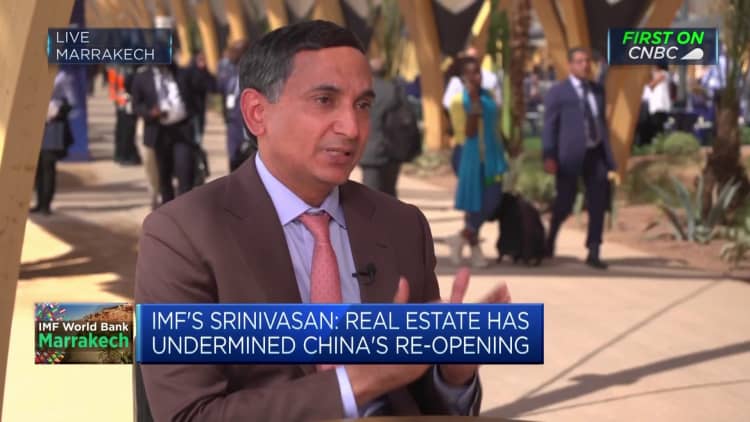According to the IMF’s October update of its World Economic Outlook, China’s economy will grow 5% in 2023, a decrease from an earlier forecast of 5.2%.
Future Publishing | Future Publishing | Getty Images
China’s old economic model of relying on investments in real estate has “run its course” and the government needs to consider boosting consumption to drive recovery, according to the International Monetary Fund.
The slowdown in real estate is the main reason for China’s sluggishness, Krishna Srinivasan, director of the Asia and Pacific department at the IMF said. “There has not been a comprehensive response to the problem and that has weighed both on investment in the real estate sector and consumer confidence.”
Although China has been trying to rebalance its economy to focus more on consumption-led growth, demand remains weak and is not growing as quickly as before the pandemic.
“One would have hoped that after China reopened, consumption would come back very strongly, but that has been undermined by confidence not coming back in the real estate sector,” Srinivasan said. “A lot of the wealth is in the real estate sector, and that has not been resolved.”
The IMF trimmed its 2023 growth forecast for China’s economy from 5.2% to 5% in its October update of its World Economic Outlook. It also reduced its 2024 forecast from 4.5% to 4.2%.

Slower growth in China is an “important risk for the global economy,” the report said.
The IMF expects global growth will slow from 3.5% in 2022 to 3% this year, before falling further to 2.9% in 2024.
“Growth remains slow and uneven, with growing global divergences. The global economy is limping along, not sprinting,” the fund said.
Consumption remains weak
Some economists are more bearish than the IMF on China’s recovery and believe its economy will grow at an even slower pace this year.
“The IMF’s view isn’t so pessimistic,” said Erica Tay, director of macro research at Maybank.
She explained that the bank downgraded its China growth forecast to 4.8% this year as it does not see the same engines that drove China’s growth in the first half of the year to be as strong.
“We are worried about consumption in the next few quarters. Revenge spending is already starting to fade off and consumer spending is expected to settle down at a weaker level than pre-pandemic,” Tay told CNBC.
Passengers arrive at the Beijing railway station on the first day of peak travel ahead of the National Day holidays in China’s capital city on Sept. 29, 2023.
Jade Gao | Afp | Getty Images
Tay noted that signs of “revenge travel fatigue” were even visible during China’s big “Golden Week” holiday during the first week of October.
Maybank predicts that the country’s consumption sector will grow approximately 6% this year, and 4% in 2024.
“Consumption of durable goods is much lower than expected because people are worried about their future. So why buy a car if they don’t know what’s going to happen next month? Why buy a house if they don’t know what’s going to happen next year,” said Alicia Garcia-Herrero, chief economist for Asia-Pacific at Natixis.
It’s not just economic scarring from the pandemic, she said, “All this is structural. When your economy ages, you consume much less and you don’t have big expectations about the future.”
A different story for India
In contrast, the fund expects India’s economy will grow 6.3% in 2023, an increase from an earlier forecast of 6.1%.
“India is on the map. There is a lot of pent-up demand and sentiment is very positive. There is a sense that India is back on the frontline and the propaganda in the media helps consumption too,” Garcia-Herrero said.
While the IMF maintained it’s 2024 projection of 6.3% growth in India, economists said the country faces a slew of headwinds.
“Widening current account deficit, resurging inflation and heightened geopolitical tensions would be the major headwinds for India,” Garcia-Herrero warned.
